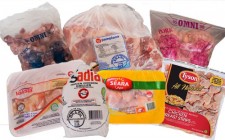 Ever wanted to refreeze food thawing on the counter for a dinner you were unable to prepare, but weren't sure it was safe to do so? What about the times when you mistakenly left the freezer door ajar, or after a power outage? Should you discard all the meat in your freezer?
Ever wanted to refreeze food thawing on the counter for a dinner you were unable to prepare, but weren't sure it was safe to do so? What about the times when you mistakenly left the freezer door ajar, or after a power outage? Should you discard all the meat in your freezer?
Unfortunately, life is filled with these unexpected occurrences and mishaps. And while our dinner plans have to change with them, does that necessarily mean the all the previously-frozen-but-thawed meat has to be tossed in order to avoid serious health risks?
Good news, the answer is no.
But certain guidelines must be followed to ensure the food remains safe to eat.
Tina Hanes, a registered dietitian with the U.S. Department of Agriculture s Food Safety and Inspection Service, told The New York Times that any food removed from the freezer --- including meat, poultry, fish and seafood -- can be refrozen as long as it was properly thawed in the refrigerator, and hasn t spoiled. (Spoiled meat or fish will begin to feel sticky, look slimy, take on a green tint and/or begin to smell.)
Here are more of her recommendations:
- Do not refreeze raw meat, poultry or fish after it was defrosted by microwaving.
- Do not refreeze these items after running them under warm or cold running water.
- Do not let properly-thawed meat sit in the fridge for too long because it will spoil. (Refer to this chart from FoodSafety.gov for time limits for specific foods.)
- Do not refreeze raw meat, poultry or fish after it was defrosted on the kitchen counter. Microorganisms on these foods will increase rapidly in this environment.
In fact, Hanes says these those three types of foods should never be defrosted at room temperature. "Thawing on the counter is not safe, period," Hanes said. "You should never do that.
As for freezing foods to make them safer to eat, you might have heard a relative say over the years that freezing foods can destroy microorganisms. That s not entirely true; freezing does not kill bacteria, all it does is put them at a resting state. Microorganisms are extinguished from food when heated to 165°F, as recommended by the Grocery Manufacturers Association.
So, to consume foods safely at a later time, remember to head straight home after shopping, wrap the food tightly in plastic and place perishables in a freezable container to maintain flavor and quality. It's also wise to label and date what you re freezing, and do so with at a recommended temperature of 0°F as per instructions from the Food and Drug Administration.


